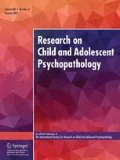Abstract
Cognitive, developmental, and psychodynamic theories all hypothesize that negative self-concepts acquired in childhood may induce vulnerability to depression. Children at risk because of maternal major affective disorder, compared with children of medically ill and normal mothers, were examined for evidence of negative cognitions about themselves, and were found to have more negative self-concept, less positive self-schemas, and more negative attributional style. It was further predicted that negative cognitions about the self would be related to maternal depression and chronic stress, and to the quality of perceived and actual interactions with the mother. In general, the predicted associations were obtained, supporting speculations about how maternal affective disorder is associated with stress and with relatively negative and unsupportive relationships with children that in turn diminish children's self-regard.
Similar content being viewed by others
References
Arieti, S., & Bemporad, J. (1980). The psychological organization of depression.American Journal of Psychiatry, 136, 1360–1365.
Beardslee, W., Bemporad, J., Keller, M., & Klerman, G. (1983). Children of parents with major affective disorder: A review.American Journal of Psychiatry, 140, 825–832.
Beck, A. T. (1967).Depression: Clinical, experimental, and theoretical aspects. New York: Hoeber.
Beck, A., Ward, C., Mendelson, M., Mock, J., & Erbaugh, J. (1961). An inventory for measuring depression.Archives of General Psychiatry, 4, 53–63.
Chambers, W., Puig-Antich, J., Hirsch, M., Paez, P., Ambrosini, P., Tabrizi, M., & Davies, M. (1985). The assessment of affective disorders in children and adolescents by semistructured interview.Archives of General Psychiatry, 42, 696–702.
Cicchetti, D., & Schneider-Rosen, K. (1986). An organizational approach to childhood depression. In M. Rutter, C. Izard, & P. Read (Eds.),Depression in young people: Development and clinical perspectives (pp. 71–134). New York: Guilford Press.
Cofer, D., & Wittenborn, J. (1980). Personality characteristics of formerly depressed women.Journal of Abnormal Psychology, 89, 309–314.
Derry, P., & Kuiper, N. (1981). Schematic processing and self reference in clinical depression.Journal of Abnormal Psychology, 90, 286–297.
Endicott, J., & Spitzer, R. (1979). Use of Research Diagnostic Criteria and the Schedule for Affective Disorders and Schizophrenia to study affective disorders.American Journal of Psychiatry, 136, 52–56.
Fielstein, E., Klein, M., Fischer, M., Hanan, C., Koburger, P., Schneider, M., & Leitenberg, H. (1985). Self-esteem and causal attributions for success and failure in children.Cognitive Therapy and Research, 9, 381–398.
Haley, G., Fine, S., Marriage, K., Moretti, M., & Freeman, R. (1985). Cognitive bias and depression in psychiatrically disturbed children and adolescents.Journal of Consulting and Clinical Psychology, 53, 535–537.
Hamilton, E., & Abramson, L. (1983). Cognitive patterns and major depressive disorder: A longitudinal study in a hospital setting.Journal of Abnormal Psychology, 92, 173–184.
Hammen, C. (1985). Predicting depression: A cognitive-behavioral perspective, In P. Kendall (Ed.),Advances in cognitive-behavioral research and therapy (Vol. 4, pp. 29–71). New York: Academic Press.
Hammen, C., Marks, T., Mayol, A., & deMayo, R. (1985). Depressive self-schemas, life stress, and vulnerability to depression.Journal of Abnormal Psychology, 94, 308–319.
Hammen, C., Miklowitz, D., & Dyck, D. (1986). Stability and severity parameters of depressive self-schema responding.Journal of Social and Clinical Psychology, 4, 23–45.
Hammen, C., & Zupan, B. (1984). Self-schemas, depression, and the processing of personal information in children.Journal of Experimental Child Psychology, 37, 598–608.
Hazzard, A., Christensen, A., & Margolin, G. (1983). Children's perceptions of parental behaviors.Journal of Abnormal Child Psychology, 11, 49–59.
Hollon, S., Kendall, P., & Lumry, A. (1986). Specificity of depressotypic cognitions in clinical depression.Journal of Abnormal Psychology, 95, 52–59.
Kaslow, N., Rehm, L., & Siegel, A. (1984). Social-cognitive correlates of depression in children.Journal of Abnormal Child Psychology, 12, 605–620.
Morrison, H. (Ed.). (1983).Children of depressed parents: Risk, identification, and intervention. New York: Grune and Stratton.
Orvaschel, H., Weissman, M., & Kidd, K. (1980). Children and depression: the children of depressed parents, the childhood of depressed patients, and depression in children.Journal of Affective Disorders, 2, 1–16.
Parker, G. (1981). Parental reports of depressives: An investigation of several explanations.Journal of Affective Disorders, 3, 131–140.
Piers, E. (1977). The Piers-Harris Children's Self-Concept Test: Research Monograph #1. Nashville, Tennessee: Counselor Recordings and Tests.
Piers, E., & Harris, D. (1969).The Piers-Harris Children's Self-Concept Scale. Tennessee: Counselor Recordings and Tests.
Seligman, M., Peterson, C., Kaslow, N., Tanenbaum, R., Alloy, L., & Abramson, L. (1984). Attributional style and depressive symptoms among children.Journal of Abnormal Psychology, 93, 235–238.
Tennen, H., & Herzberger, S. (1985). Depression, self-esteem and the absence of self-protective attributional biases.Journal of Personality and Social Psychology.
Weissman, M., Paykel, E., & Klerman, G. (1972). The depressed woman as a mother.Social Psychiatry, 7, 98–108.
Author information
Authors and Affiliations
Additional information
This research was supported by a William T. Grant Foundation award to Dr. Hammen and a Veterans Administration Merit Award to Dr. Hiroto.
Rights and permissions
About this article
Cite this article
Jaenicke, C., Hammen, C., Zupan, B. et al. Cognitive vulnerability in children at risk for depression. J Abnorm Child Psychol 15, 559–572 (1987). https://doi.org/10.1007/BF00917241
Revised:
Issue Date:
DOI: https://doi.org/10.1007/BF00917241




